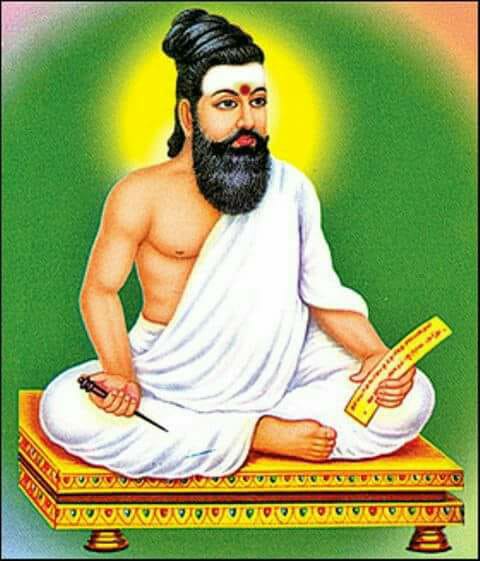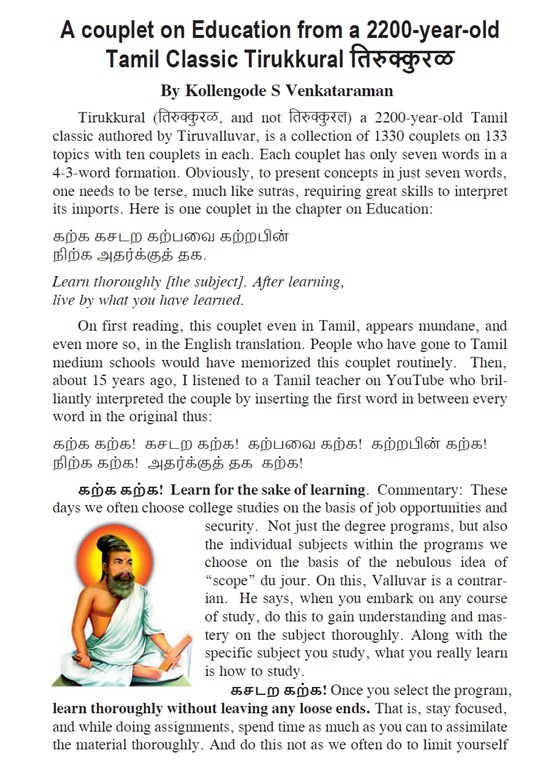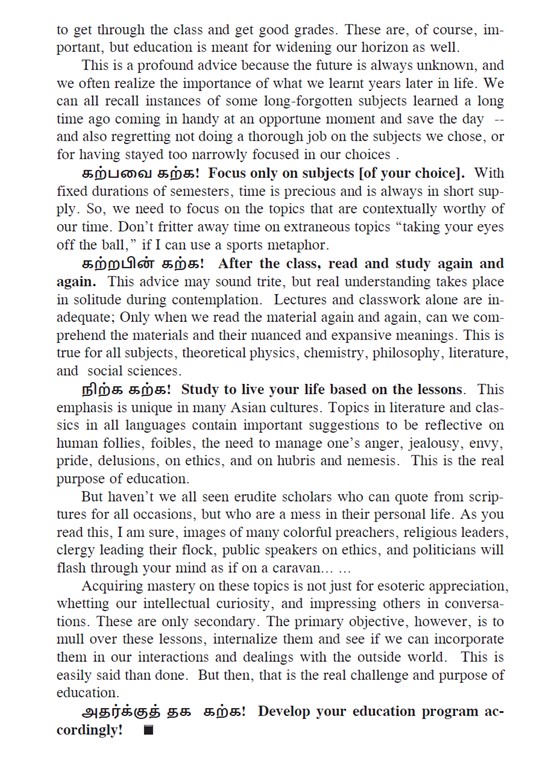Archive for category January 2021
A couplet on Education from a 2200-year-old Tamil Classic Tirukkural
Posted by admin in January 2021, Past issues on December 31, 2020
By Kollengode S Venkataraman
Tirukkural (तिरुकुरळ not तिरुक्कुरल), a 2200-year-old Tamil classic authored by Tiruvalluvar, is a collection of 1330 couplets on 133 topics with ten couplets in each. Each couplet has only seven words in a 4-3-word formation. Obviously, to present concepts on different topics in just seven words, one needs to be terse, much like sutras, requiring great skills to interpret its imports. So, the interpreter’s skills and insights make a huge difference in what we understand. Over the last 10 to 15 centuries, over ten scholars have written commentaries on this literary work. Here is just one couplet in the chapter on Education:
கற்க கசடற கற்பவை கற்றபின்
நிற்க அதற்குத் தக.
Translation:
Learn thoroughly [the subject]. After learning,
… … live by what you have learned.
On first reading, this couplet even in Tamil, appears mundane — and even more so, in my English translation. People who have gone to Tamil medium schools would have memorized this couplet routinely. Then, about 15 years ago, I listened to a retired Tamil pandit — to this day, I regret for not jotting down his name — on YouTube who brilliantly interpreted the couplet by inserting the first word in between every word in the original thus:
கற்க கற்க; கசடற கற்க; கற்பவை கற்க; கற்றபின் கற்க;
நிற்க கற்க; அதற்குத் தக கற்க.
And he elaborated this further in Tamil, the gist of which I give below in English:
கற்க கற்க! Learn for the sake of learning, implying that we should not pursue education with the idea of earning name, fame and money. These are, of course, important, but only useful byproducts of education. Besides, accomplishing these is not in our hands, really speaking. But whether we accomplish these are not, the purpose of education is to widen our horizon, and that is the best and only worthwhile reward we get for education. Whether we get name, fame, or wealth or not, we can still lead satisfying career as teachers, engineers, doctors… … — without too much of a stardom. As a matter of fact, this is where most of us end up in life, and most of us have no regrets.
Commentary: These days we often choose college studies on the basis of job opportunities and job security. Not just the degree programs, but also the individual subjects within the programs we choose on the basis of the nebulous idea of “scope” du jour. On this approach, Valluvar is a contrarian. He says, when you embark on any course of study, do this to gain a thorough understanding and mastery on the subject chosen. This is because, no doubt, the details of the specific subject we study is what we get. But what we subliminally learn is how to study the subject. For example, the approach we take to study preliminaries of organic chemistry is mostly memorizing terms and terminologies. However, when we approach the theories of organic reactions, the approach is analytical, and logical requiring abstract thinking, and entirely different. That he elaborates further:
கசடற கற்க! Learn thoroughly without leaving any loose ends, [once you select the program]. That is, stay focused on the subject, and while doing assignments, spend time as much as you can to assimilate the material thoroughly. And do this not as we often do to limit ourselves to get through the class and get decent grades. These are, of course, important, but real purpose of education widening our horizon of understanding the phenomenal world, and grades are what we collect along the way.
This is a profound advice because the future is always unknown. And we often realize the importance of what we learnt years years ago much later in life. We can all recall instances of some long-forgotten subjects learned a long time ago coming in handy at an opportune moment and save the day for us — and also regretting for not doing a thorough job on some of the subjects we chose, or for having stayed too narrowly focused in our choices .
கற்பவை கற்க! Focus only on subjects [of your choice]. With fixed durations of semesters, time is precious and is always in short supply. So, we need to focus on the topics that are contextually worthy of our time. Don’t fritter away time on extraneous topics by “taking your eyes off the ball,” if I can use a sports metaphor.
கற்றபின் கற்க! After the class, read and study the material again and again. This advice may sound trite, but in any study, real understanding takes place in solitude during contemplation. Lectures and classwork alone are inadequate. Only when we read the material again and again, can we comprehend the topics and their nuanced and expansive meanings. This is true for all subjects, but particularly in subjects like theoretical physics, thermodynamics, theoretical foundations of Indian music in terms of melody and layam, physical chemistry, philosophy, literature…
நிற்க கற்க! Study to live your life based on the lessons learned. This emphasis on education is unique in many Asian cultures. Topics in literature and classics in all languages contain important suggestions for the students to be reflective on human follies, foibles, the need to manage one’s anger, jealousy, envy, pride, delusions, on ethics, and on hubris and nemesis. This is the real purpose of education. That is why these days they want engineering and medical students to take one of two courses in creative arts, philosophy, literature, writing… …
Acquiring mastery on these topics is not just for an esoteric appreciation, whetting our intellectual curiosity, and impressing others in conversations. These are only secondary. The primary objective of education, however, is to mull over these lessons, internalize their import and see if we can incorporate them in our interactions and dealings with the outside world. This is easily said than done. But then, that is the real challenge and purpose of education. This is where repetition has a useful purpose.
Haven’t we all seen erudite scholars who can quote from scriptures for all occasions, but who are a mess in their personal life and living their lives quite contrary to what they preach? As you read this, I am sure, images of many colorful preachers, religious leaders, clergy leading their flock, public speakers on ethics, and politicians will flash through your mind as if they are on a caravan… …
அதற்குத்தக கற்க! Develop your education program accordingly! END
Home:
Thank You, Readers, for Your Generous Contributions
Posted by admin in January 2021, Past issues on December 29, 2020
By Kollengode S and Prema Venkataraman
In the last issue, we had appealed for voluntary contributions from readers to get through the financial crisis, because of advertisements vanishing in one stroke in the Covid-19 pandemic. Hotels, banquets, restaurants, and wedding planners, who are our mainstay advertisers, are the worst affected. Nobody knows precisely how long the recovery will take, and in what form it will re-emerge at the end.
The voluntary contributions from readers are heartening. Our target for the fundraiser was $20,000 for four issues in 2021 (basis: $5000/issue). Against this target, we nearly $12,000, or 60% of the target (~$7,600 on-line and ~$4,400 by checks). The details of lists of donors are here.
We thank all donors for their generosity. And we continue to seek contributions from readers who have not yet pitched in to help us reach our target of $20,000. The reason for this is simple:
The outlook for the hospitality sector in 2021 looks uncertain; but with the vaccines already in place, there is optimism in the air. Even with proven vaccines, the logistical challenges of inocculating 330 million people are daunting. So, it is prudent to expect that advertisers will be slowly trickling back in 2021 as the pandemic’s vehemence subsides. So, the magazine will be in the truncated format for now with fewer ads.
Many readers sent hand-written notes with their checks. These invaluable notes were encouraging and reassuring. The magazine, many wrote, raises relevant issues and disseminates timely information, also serves as a glue, tenuously holding together the fragmented and scattered Indian Diaspora here. Readers’ and advertisers’ trust and support are the only reasons for the magazine to exist.
The Patrika continues to provide a platform with articles and opinion pieces written by people living among us. The gratifying part is this: articles by writers among us on how others in our midst are enriching our lives through their extra-professional activities. And these include their interactions with the American mainstream in interfaith groups, as artistes, and as arts patrons. We urge readers to write for the magazine, sharing with readers their observations and experiences.
Readers who have not yet contributed, may send their checks to:
The Pittsburgh Patrika, Inc.,
4006 Holiday Park Dr., Murrysville, PA 15668; or
go to www.tinyurl.com/SubscribePatrika and make their contributions on-line.
Home:
A Couplet on Education fro the 2300-year old Tamil Classic
Posted by admin in January 2021, Past issues on December 29, 2020
List of Contributors for the Patrika Fundraising
Posted by admin in January 2021, Past issues on December 29, 2020
Thank You Very Much (Status as of December 10, 2020)!!
Note: Many contributors wanted to remain anonymous. Therefore, for respecting their request and protecting their privacy, we have used ellipsis (… …) in listing their names, and yet tried to let the donors know that we have included them in the list below.


Fundraiser Target: $ 20,000.00
Total Contribution: $ 11,983.00
….. On-Line Contributions: $ 7,606.00
….. By-check Contribution: $ 4,377.00
(As of December 10, 2020)
We urge those who have not yet contributed to please go to GoFundMe and make your contributions on-line.
Home:
Punarjanma — Rebirth
Posted by admin in January 2021, Past issues on December 29, 2020
By Dolly and Juginder Luthra, Weirton, WV dolgin1968@gmail.com
Note: Last autumn, I followed a set of deciduous trees taking daily pictures to track their color change, and posted 20 of these daily pictures on-line to show their transitions: https://tinyurl.com/FiveTreesAutumn. The three pictures shown below are from these pictures posted on-line. Dolly & Juginder Luthra, after seeing the trees in transition on-line, sent the poem they had written sometime ago inspired by a similar scene. — By Kollengode S Venkataraman.
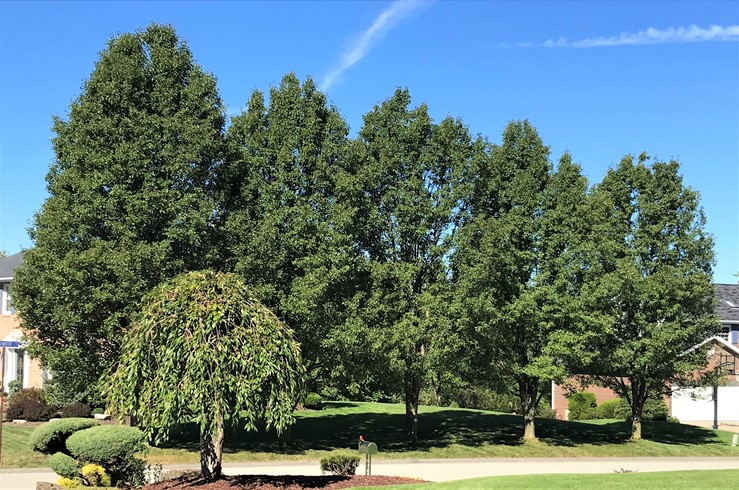
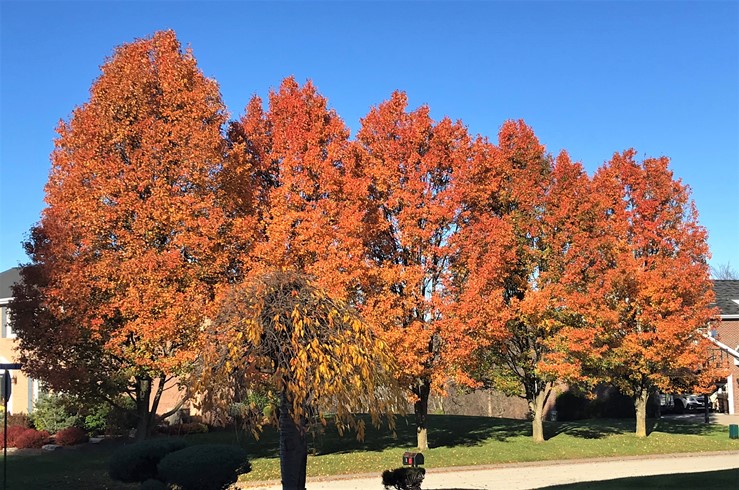
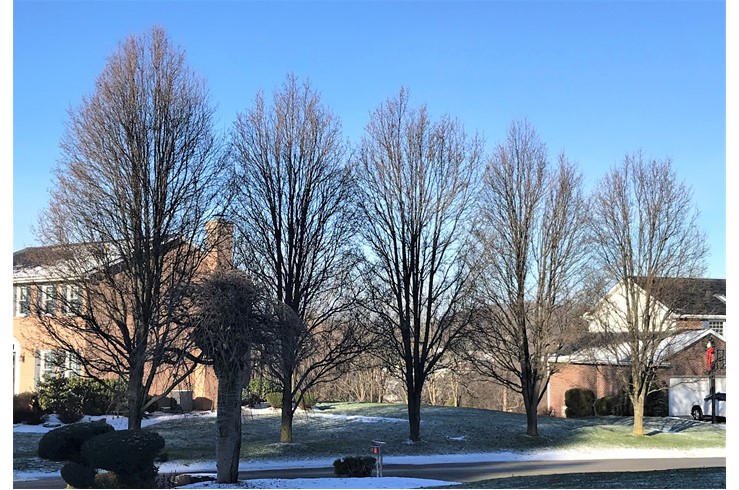
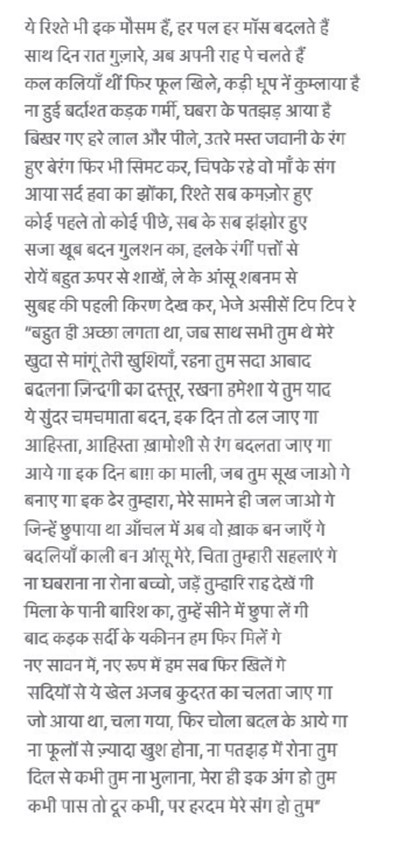
Relations are seasons, changing each moment, every month
Spent days n nights together — now on own paths
Buds yesterday, then flowers bloomed, withered by sunshine
Couldn’t tolerate the blistering heat; then nervously Fall arrived
Scattered green, red & yellow, the intoxicated youthful colors faded
Colorless they wound up, staying connected with their mother
Came one gust of cold wind, all relations weakened
Some first others later, all got shaken
And the garden’s body decorated by faded colored leaves
Cried branches from above, drawing tears from dew
First ray of sunshine, sent blessings — drip drip drip
“Felt very good when you were with me
Asked God for your joy, may you live forever
Change is way of life, you always must remember
This shiny body, one day will weaken
Silently slowly this color will keep changing
One day gardener will come when you’re fully dry
Piled into a heap, you will burn in front of my eyes
Not too long ago, I hid you in my lap; now you become ashes
Black clouds become teardrops, and caress your pyre
Don’t worry or cry, my children, roots will look for you
Mixing with rain water, they will hide you inside my bosom
After bitter cold surely we will meet again
In new spring, in new form, we will bloom again
For centuries this play of nature will go on
One who came, left, then returns in altered garb
Don’t be overjoyed in Spring — nor cry in Fall
Never forget in your heart, you’re my body part.
Home:
Obituary: Tandav Magge (1932 to July 24, 2020)
Posted by admin in January 2021, Past issues on December 29, 2020
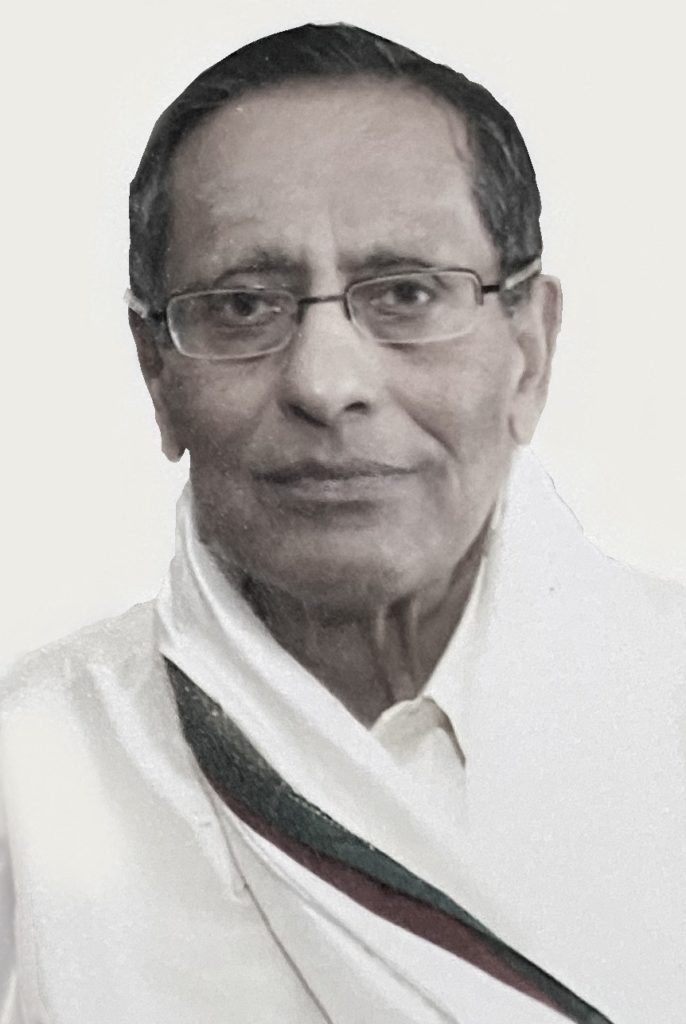
Tandaveswara (Tandav) Subramanyam Magge was born in Mysore, India on March 1,1932 to Hosakote Seethalakshamma and Subramanyam N. Magge. Tandav was the second of five children. His sisters Krishnaveni and Shashi are now deceased; and Tandav now is survived by his younger brothers Natesh and Shankar. When Tandav was 15, his father passed away and his brother-in-law M.R. Lakshminarayana stepped in to raise him and take care of his education and upbringing.
After completing his Bachelor of Science and Bachelor of Engineering degrees from the University of Mysore, Tandav came to the U.S. in 1961 to continue his education and join his brother. He had a very special bond with his brothers and sisters’ children and their families. As such, he worked very hard to bring the next generation of the family to join him in America.
Tandav received a master’s degree in industrial engineering from New York University and a master’s in mechanical engineering from Northeastern University. He worked at Curtiswright and General Electric for over 12 years designing aircraft engines. He then held a long and distinguished career for over 35 years at Westinghouse Electric Company in Pittsburgh, before retiring in 2012.
He was dedicated to his wife of 65 years, Susheela, as well as their children — Lakshmi an internist (and husband Ramesh, a cardiologist), Keshav, a plastic surgeon (married to Monica, a Marketing consultant), and Sandya, a financial services executive (married to Ketan, a lawyer).
His daughter, Lakshmi, was tirelessly dedicated to her father’s medical care, serving as his physician for over 30 years. He adored his grandchildren Anita, Ashwin, Lila, Veda, Zane, and great grandson, Niam. He was able to meet his newest grandson, Rohan, shortly before he passed away.
Tandav was grateful for his Pittsburgh community of friends and supporters. He was a dedicated/hardcore fan of all Pittsburgh sports including football, baseball and hockey. He passed away at his home on the night of July 24th with his family by his side. He will forever be missed, but his legacy will never be forgotten. — Submitted by Mr. Tandav Magge’s loving family members
Home:
All Elections — Even Presidential Ones — are Local
Posted by admin in January 2021, Past issues on December 29, 2020
The Polarized Voting Patterns Only Sharpened in 2020
By Kollengode S Venkataraman
In twelve presidential elections prior to 2016, Pennsylvania voted Democratic in eight — Humphrey (1968), Carter (1976), Clinton twice (1992, 1996), Al Gore (2000), John Kerry (2004), and Obama twice (2008 and 2012); and Republican in four (Nixon in 1972, twice for Reagan in 1980 and 84, and for George Bush in 1988). The state voted Democratic in all the previous six presidential elections with a comfortable margin of well over 100,000 votes. So, even though we are socially and culturally conservative, politically we are left-leaning in the aggregate. In 2016 we chose President Trump with a thin margin of 46,000 votes.
So, in 2020, for both Democrats and Republicans, Pennsylvania was a must-win state to hit the magic 270 number in the electoral votes. Crucial for GOP for retaining the White House for four more year, and for Democrats, for dislodging the divisive incumbent. In American politics, retaining is lot easier than dislodging. No wonder, during this summer/fall, I received over 100 political phone calls, more of them from Democrats. Because of the Covid Pandemic, the primary season was subdued; no made-for TV jingoistic nominating conventions; no campaign rallies in summer/fall.

Opinion makers from both Right and Left told us that the country was sharply polarized politically as never before — between voters in densely populated urban areas and sparsely populated countryside; and between the college-educated and those without college degrees.
In the US, while the densely populated demographically diverse urban clusters are heavily “Blue,†sparsely populated relatively homogeneous rural counties are bright “Red,†with suburbs falling in between with a strong GOP streak. See the image above on the population density of Pennsylvania. Pennsylvania is typical on this measure.
As shown in the map shown below major urban centers voted Democratic, while rural counties voted for Trump in the 2020 elections. But Trump’s polarizing, shrill rhetoric and mishandling of the pandemic, many believed, would make the college-educated, white-collar suburban voters to go for Biden in large numbers, making it easy for him to defeat Trump. At least, that is how I read the media coverage.
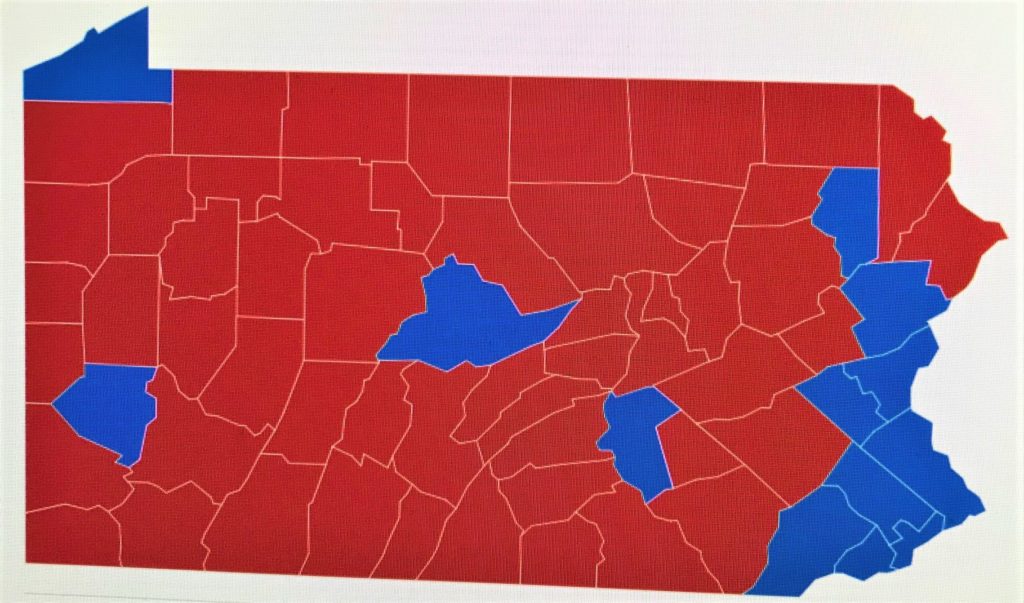
I live in Westmoreland County, adjacent to Allegheny County (which has Pittsburgh at its center). So, I compared the votes cast in counties around Pittsburgh in the 2016 and 2020 presidential elections, looking for a trend of suburban voters switching to Biden. What I saw surprised me. The bar chart below shows how Allegheny County voted in the last two presidential elections favoring the Democrats. While Republicans received ~255,000 in 2016, they got ~285,000 in 2020. But Democrats did much better: ~360,000 in 2016 vs.~430,000 in 2020). (numbers rounded to the nearest ‘000)
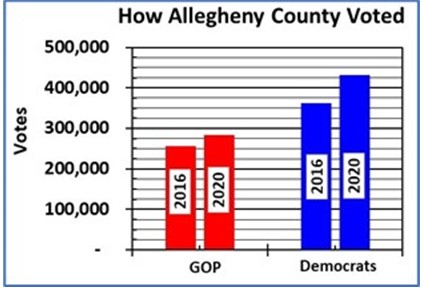
The bar chart below shows how the neighboring counties voted. All the aggressive campaigning by both the Democrats and the GOP folks had the desired effect. In all the counties around Pittsburgh, compared to 2016, both Republicans and Democrats got more votes.
In addition, as the table further below titled “Westmoreland County” shows, in Westmoreland County, in both 2016 and 2020 Trump got almost the same number of more votes — 56,000 in 2016, and 57,000 in 2020 — than his Democratic opponent. The change in the voting pattern favoring Democrats was small (1.6%) between 2016 and 2020, and there was no windfall shift favoring Democrats.
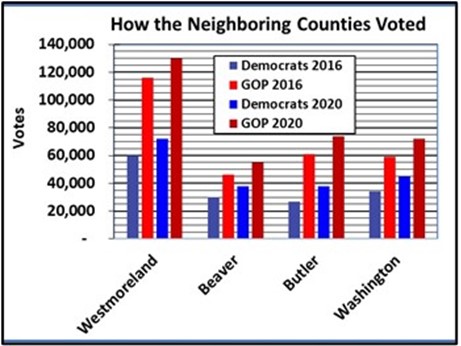
That is, Westmoreland County is still heavily Republican, Covid or No Covid, with almost 2:1 split favoring the GOP as before. This is despite the four years of Trump’s shrill rhetoric and lies, and despite his illogical approach to the pandemic ignoring all the advice from public health officials. This trend was seen in all suburban counties as shown in the bar chart on the side. While both parties increased their votes, the suburban counties continue to be heavily Republican in terms the vote split.
How the State as a Whole Voted: The table further below titled “PA State-Wide” compares the total votes for the entire Commonwealth of Pennsylvania in 2016 and 2020 elections. Again, here too, both parties got more votes for themselves in 2020 compared to what they got for 2016. In 2020, Republicans got 489,000 more votes (3,460.000 – 2,971,000) than what they got in 2016. Democrats did even better on this, getting 452,000 more votes in 2020 compared to 2016, with more votes coming from urban areas around Pittsburgh, Philadelphia, Harrisburg, Allentown, and State College. The net result of this aggressive state-wide campaigning resulted in Biden getting 82,000 more votes than Trump, thus bagging the crucial 20 delegates.
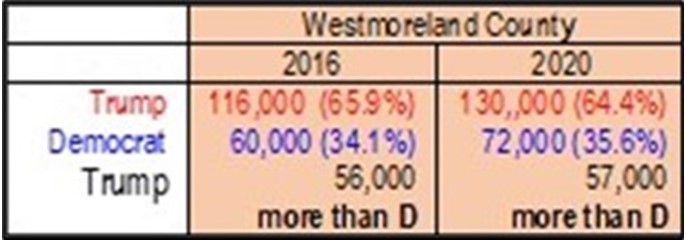
The contrasts in the voting patterns between the densely populated demographically diverse urban Allegheny County and the neighboring sparsely populated counties, shown in the two bar graphs above stand out. The urban areas favor Democrats, with the suburban counties heavily favoring Republican. This trend is the same in other urban areas such as Philadelphia, Harrisburg, State College, and Allentown. Sparsely populated and demographically homogeneous rural counties are even more sharply Republican. The (in)famous quote attributed to James Carville, “Pennsylvania is Philadelphia [in the east] and Pittsburgh [in the west] at the ends, with Alabama in between,†has not changed one bit in the last 30 years, even with Covid-19 and even with Trump in the White Hose.
This Urban-Suburban-Rural divide is an enduring trend all across the 50 states in the US. This is worrisome. Under democracy, nation-states so sharply polarized are difficult to govern. Deeply entrenched suspicion and vested interests make compromises difficult.
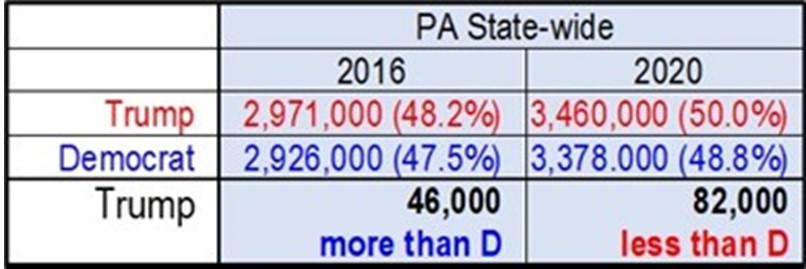
One glaring example of this vested interest was how the GOP-controlled state legislature in Harrisburg shamelessly drew and re-drew the maps for the Congressional districts favoring the GOP so that they got a 13/5 split in the Congressional delegation. This was despite the state as a whole has been voting 45:55 split between the two parties in presidential elections. Three years ago, the Commonwealth High Court had to intervene to redraw the congressional districts to make it more representative. After this, in the last two elections, the delegate split between GOP and Democrats is 9/9, more reflective of the state’s voting pattern.
Campaigns are fought from ideological extremes with simplistic and contrasting slogans that can be fitted into bumper stickers and placards. However, governing is possible only from somewhere in the middle, with the necessity and willingness to make compromises, which are always anathema to ideologues on both sides. Sadly, such political polarization all across the nation has led to social and cultural polarization as well. Already, Urban, Suburban and Rural Americas live in their own isolated and insulated silos of sharply different value systems, priorities and perceptions with very little interactions among each other, with mutual condescension and disdain. This often morphs into mutual animosity towards each other when taxation and resources allocations are debated and legislated by state assemblies, making governing more difficult. END
Home:
CCAC Creatively Responds to the Pandemic
Posted by admin in January 2021, Past issues on December 29, 2020
By Srujana Kanjula, Wexford, PA
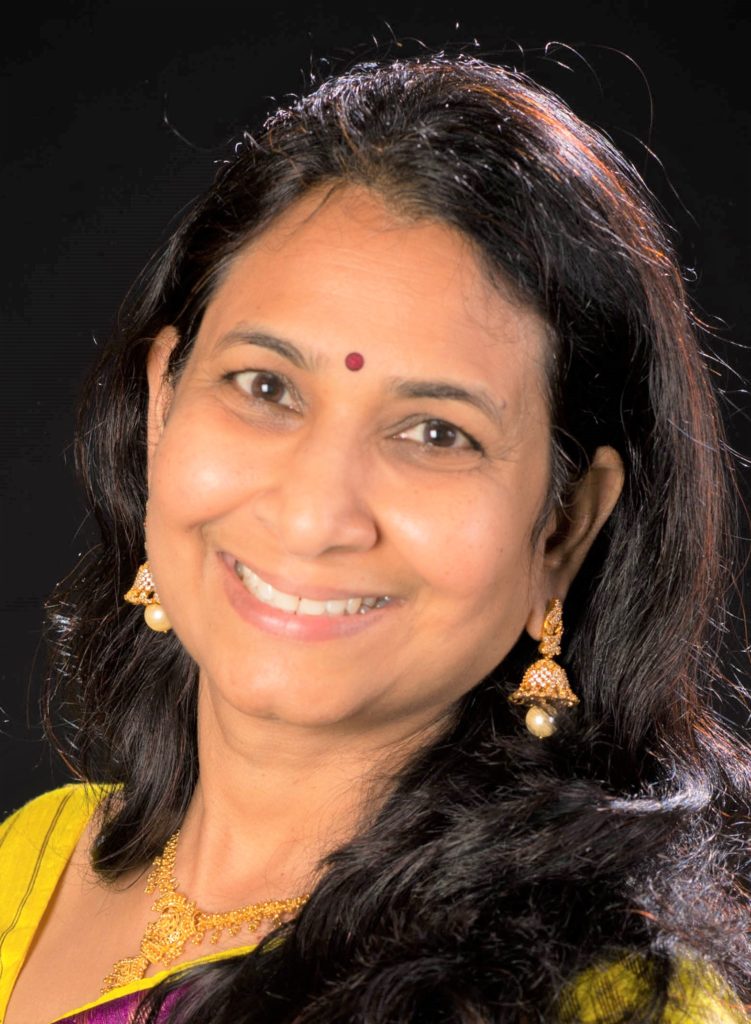
Editor’s Note: Prof. Srujana Kanjula, a full-time faculty at the Community College of Allegheny County (CCAC), shares her experience and observations during the COVID-19 pandemic as CCAC continues with its mission in teaching. Community colleges, unlike regular big-banner universities, have unique challenges, opportunities — and responsibilities — for attracting students to their programs. Through the Covid pandemic CCAC manages to deliver quality education to its students using creatively tailored online and virtual classes.
The COVID-19 pandemic disrupted all educational institutions, and CCAC is no exception. CCAC modified its operations, initially closing all facilities, and extending support to the community. When the region faced PPE shortages, we donated hundreds of gloves, isolation gowns, and masks to frontline health care professionals.
CCAC quickly converted hundreds of courses from in-person to remote. Allison Barash, my colleague and a professor of psychology, told me: “When CCAC abruptly closed, I wondered how I could transition from in-person to remote delivery. Then CCAC moved up the spring break giving us time to get up to speed, and provided the faculty a plethora of online training sessions. I liked learning remote teaching techniques. I am facile with Zoom now. Surprisingly, attendance was good, and students enjoyed my creativity with visuals, polls, and breakout rooms.â€
The economic challenges were many, but the college administration ensured that adequate finances are available to continue delivering quality instruction with many supportive services. CCAC provided laptops to over 250 faculty members. The college also received funding through the federal government’s CARES (The Coronavirus Aid, Relief, and Economic Security) Act, which helped combat fiscal challenges. As of 1st October, this funding helped 6500 students with $500 grants. The CCAC Educational Foundation awarded $200,000 in scholarships to 267 students, emergency funds to 34 students, and distributed laptops to over 200 students. All these were done within a short span of time.
Tyler Anderson, a digital design student says, “I’m grateful to CCAC for giving me a laptop to continue my education in digital design without interruption as I didn’t have to worry about my pieces looking inconsistent. This shows that CCAC cares about students’ success!†.
Another student, Ashika Richardson elaborated, “As a first-year student, I was nervous, especially in a virtual setting. But CCAC gave help with on-line services and tech support to accommodate all my registration and academic needs. My professors made my semester academically enriching and my experience invigorating.â€
In addition to teaching, I personally advise the World Cultures Club. In spite of the college closing, we had 15 new students join the club, and we successfully organized virtual events on Hispanic Heritage, Interfaith, Racial Justice, Indian Classical Dances, and on the 2020 elections.
Maxine Russo, another freshman, explained, “Joining the World Cultures Club gave me opportunities to interact with the college community and practice my public speaking and problem solving skills. I could participate in discussions on various cultural and political topics via Zoom and learn from other’s perspectives and experiences. As an organizer, I introduced guest speakers, moderated questions, helped with crowd control, and shared my insights. As a student interested in going into politics, I learned how to be professionally civil while dealing with problems. This club helped me come out of my shell and thrive.â€
Ashika remarked, “I served as a panelist in the virtual discussion on Understanding Racial Disparities in 2020. As a Jamaican student living in America, I got the opportunity to share my international perspective on racism. During this difficult time, CCAC created platforms for students to engage in meaningful conversations.â€
As the enrollment has decreased due to pandemic and economic downturn, CCAC is preparing to provide more certificates and credentialing programs along with general workforce development offerings. This is intended to help those individuals searching for new career opportunities and education credentials.
Prof Barash rightly concluded, “I give CCAC tremendous credit for being pro-active during this challenging time, keeping us safe, and preparing the faculty so we could give our students the best possible educational experience under extraordinary circumstances.†.END
Home:
Obituary: Nagabhushanam Nunna (1939 – September 21, 2020)
Posted by admin in January 2021, Past issues on December 29, 2020
By G. Paul Manoharan, Upper St. Clair, PA gopalsamy.manoharan@stifel.com
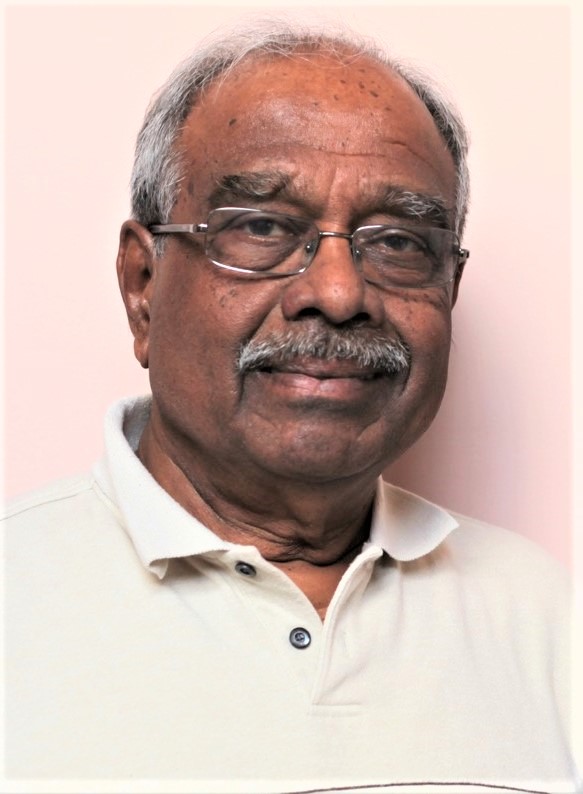
Dr. Nagabhushanam G. Nunna, known simply as Bhushan to his contemporaries, and as Nunna-Garu for people from the Andhra Pradesh, passed away peacefully on Monday, September 21, 2020. He was a resident of the Pittsburgh area for nearly five decades and a pillar of the Indian American Community. He leaves behind Dr. Sitalakshmi, his beloved wife of 56 years of marriage, his four daughters — Jyothi Jayaraman, Madhavi Rubbo, Jyothsna Nunna, and Manjula Evans — who he referred to as “my four angels,†six grandchildren, an extended family of relatives, and a large number of friends in the Indian American community. Bhushan’s efforts in promoting classical Indian performing arts and his pioneering leadership in establishing an authentic Hindu Temple in Pittsburgh enriched all our lives. Elders of the Indian community in North America acknowledge him for this service simply because fifty years ago, we were not as resourceful as we are today.
My wife Mani and I first met Bhushan socially in 1971. We got to know him more at the Hindu Jain Temple in Monroeville, especially during “The Conflict.†We worked with him during the formation of Sri Venkateswara Temple and for over forty years since then. Over the years, my admiration for him had grown for his integrity, his attention to details, and his courage to fight for things he believed in, even if it was not popular.
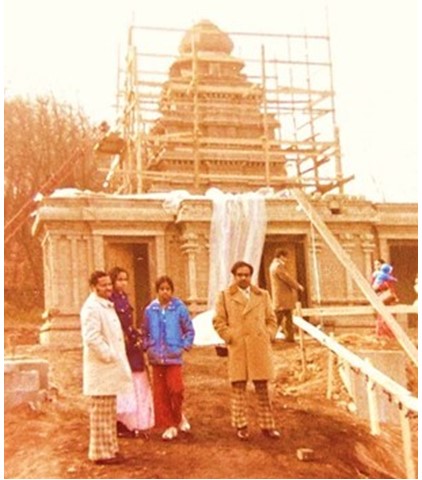
Nunna was born in 1939 in Kadapa, Andhra Pradesh and graduated from the Manipal Medical College. He married Dr. Sitalakshmi in 1964. He came to New York in 1965, himself first. His wife joined him later.
Bhushan started residency in New York in 1965, followed by fellowships at UPMC in Pittsburgh. In those nascent days of Indian community, Bhushan was one of the first to venture into and succeed in private practice in Butler in 1972. He inspired other Indian physicians to go into private practice. He later joined the staff of the Butler Memorial Hospital, from where he retired in 2001.
Bhushan, in early 1970s, encouraged Ms. Jaya Mani of Slippery Rock, a new immigrant from India trained in Bharatanatyam, to teach dance for children here. Jaya was married to Dr. S.B. Mani, a teaching faculty at the Slippery Rock University (now retired).
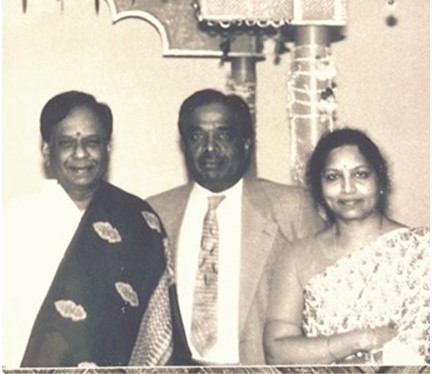
Nunna threw open the basement of his house in Butler for the dance class, and pretty soon during weekends — sometimes even during week-days — his home was filled with students learning dance, and veena lessons offered by his wife, an established veena artist. The dance classes became so popular that they were moved to the basement of an Indian grocery store in Squirrel Hill. It has been growing ever since and has enriched the lives of countless youngsters here. Bhushan’s two older daughters, Jyothi and Madhavi, were the first to have their Bharatanatyam Arangetram in Pittsburgh. Thus, the performance arts scene in Pittsburgh started in Bhushan’s basement. With passion and deep interest in Indian classical performing arts, the Nunnas hosted many visiting artistes from India.
Bhushan was one of the three incorporators of Sri Venkateswara Temple at its inception. It took considerable efforts by Bhushan to first convince Indians in Pittsburgh the need for a Hindu temple, and then persuade the Tirumala Tirupati Devasthanam officers for their help in building an authentic Hindu temple here. The Tirupati officials were skeptical of the idea after the failure to build a Venkateswara Temple as part of the Monroeville Hindu Jain Temple. Eventually, they wholeheartedly embraced the idea for the S.V.Temple here in Pittsburgh. The tie up with the Tirupati temple was invaluable in the formative years.
Bhushan was the first Chairman of the Board of Trustees of the Temple and he continued to serve the Temple to the fullest extent he could in official and other capacities. His leadership and unflailing support for the causes he believed in helped in establishing the Temple as a unique institution for Hindus in North America.
Echoing similar thoughts, Saraswathi and Thippeswamy Channapati of Butler, who knew the Nunnas for decades, add: “Nunna-Garu, an attentive and compassionate physician was busy, and still found time for community work, like revising the bylaws for Butler Memorial Hospital. He applied the same energy and attention-to-details in establishing the Sri Venkateswara Temple. In the early days, he himself videotaped hundreds of hours of cultural programs of children and professionals alike at the temple. He was so committed to the temple that even during his final days, he passionately advocated the need for changes and reform. Dr. Nunna believed in putting principles over personal relationships.â€
The cause of his death was complications following open-heart surgery. Dr. Nunna received a traditional Hindu cremation service in Butler, with Shri Venkatachari from S.V.Temple as the officiating priest. Bhushan’s accomplishments are many more. He surely enriched the lives of everyone around here in the early days. God Bless him. END
Home:
The Crazy National Elections of the First World
Posted by admin in January 2021, Past issues on December 29, 2020
By Kollengode S Venkataraman
The US, the First World’s leader, routinely sends monitors to oversee elections in the wretched Third World, to educate them on democracy and peaceful transfer of power, and to prevent voter intimidation and ballot box stealing. Now, the president of the leader of the First World, Donald Trump, has been characterizing the 2020 elections in which he himself is the candidate, using the same terms, just because he lost. And lost it big, both in popular votes and the mysterious electoral college votes.
Donald Trump, already a global laughingstock for quite some time, also turned the GOP that nominated him into a grotesque caricature, and a willing accomplice in his shenanigans. Republicans used to brag about their righteousness rooted in their Judeo-Christian heritage, personal rectitude, fiscal responsibility, and ethical probity. Their astounding hypocrisy in acquiescing to Trump, who is the antithesis to these values, is embarrassing even to some of GOP’s own leaders. In this long drawn tragicomedy, the US lost some of its sheen and moral high ground on these matters.
The nine unelected High Priests in black gowns unanimously refusing to put up with Trump’s pranks are the saving grace in this drama. Relish the irony here: six of them are appointed by Republican presidents,
If election fraud was pervasive against the Republicans, how is that they gained more seats in the Congress, and GOP’s grip in state legislatures is intact? The rank-and-file Republicans may not accept the nation rejecting Donald Trump in the elections, both as a person and as president. That is how Trump built up his supporters appealing to their insecurities, fears, and racial/religious/ethnic prejudices.
What is embarrassing is that not many in the GOP leadership stood up to their president even after he lost big in both popular votes and the electoral college votes.
As many suspect, if foreign hands (China, Russia, their surrogates and others) were at work for weakening the US, they got their job done with great finesse by damaging it from inside with very little cost to themselves.
Now it will take quite some time and lot of diplomatic skills for President Biden to regain the lost ground for the US, as he gets ready to fight the Covid-19 pandemic on multiple fronts. END

